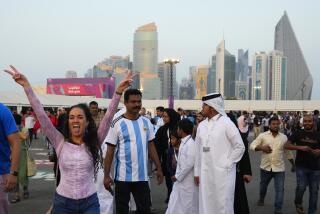A sticky wicket for cricket
- Share via
KINGSTON, JAMAICA — Behind orange net fencing that cordons off much of Norman Manley International Airport, the skeletal frame of a new terminal looms as a nagging reminder that this host nation of the Cricket World Cup has only a month to go before 15,000 fans descend on this city.
Across Kingston Harbor, the Sabina Park stadium also is a work in progress, with a moat-like trench encircling the playing field and blocked-off streets littered with earthmovers, loaders, bulldozers and piles of pipes for a much-delayed sewer and water project.
Depressed and dilapidated, downtown Kingston was supposed to be the main beneficiary of a $10-million government outlay last year for an island-wide beautification program to show Jamaica’s best face to the world of cricket. But St. William Grant Park remains a malodorous refuge for the homeless and drug-addicted, waterfront flower beds and park benches never materialized, and gang violence has killed more than 100 people nationwide since New Year’s Day, most of them in Kingston.
Jamaica is not ready for its close-up. As host of the prestigious event’s opening ceremony in Trelawny on March 11 and semifinals here in late April, Jamaica is probably the most laggard of the Caribbean venues involved in the International Cricket Council’s most logistically challenging and costly tournament ever staged: 67 matches spread over 54 days at 12 venues in Antigua and Barbuda, Barbados, Grenada, Guyana, Jamaica, St. Lucia, St. Kitts and Nevis, St. Vincent and the Grenadines and Trinidad and Tobago -- none said to be fully ready.
Even the opportunity to showcase Jamaica before the Cup’s expected 2.2 billion global TV viewers apparently hasn’t been enough to spur builders and organizers off what residents call “island time.”
“I don’t know if Houdini or Mandrake are going to suddenly appear and wave a magic wand and bring Kingston and its environs up to speed to host the cricket,” Kingston Mayor Desmond McKenzie said at a recent meeting of fellow politicians from the opposition Jamaican Labor Party. He deplored the state of his city as “a national disgrace” and said only about a third of the planned face-lift projects were likely to be completed on time.
The official line at Jamaica Cricket 2007 Ltd., the national organizing entity, is that the bare essentials will be ready. But they concede that the face Jamaica will show to the world may not be pretty.
“The requirements of the World Cup have brought out our deficiencies as a city and a country,” said Robert Bryan, executive director of the national organizing firm. “It would have been a great opportunity to do something special, given the enormity of the World Cup, and we are in danger of missing this opportunity.”
Despite the botched face-lift and tardy infrastructure improvements, Bryan exudes confidence that Jamaica can still carry off a successful tournament. His staff is scrambling to relocate tour groups to safer enclaves outside Kingston, to schedule daily Air Jamaica shuttles from coastal resorts to the capital, and to reroute traffic from the potholed roads that will be overwhelmed by buses stuffed with fans converging on the stadium.
“The stakes are quite high, economically, because we are a tourism country. Our ability to take care of visitors is of utmost importance,” said Bryan, noting that Jamaica had a record 3 million visitors last year, with few of them touched by the country’s notorious rates of violent crime.
Overall security for the islands has been stepped up with a special training course run by the Organization of American States in St. Lucia and a new visa requirement for Third World cricket patrons.
For the tournament, only citizens of the United States, Canada, Britain, France, Germany, Italy, Spain, Ireland, Japan, the Netherlands, South Africa and the Caribbean Community, except for Haiti, will be spared the $100 cost and weeks-long delay of a visa application.
Perhaps a more daunting threat for the national organizers and the Jamaican People’s Party government is the prospect of massive debt after the 47-day party is over.
The Jamaica Chamber of Commerce warned this month that the government probably would recoup only about 10% of its $105-million investment in tournament facilities, from ticket sales and taxes. Chamber President Mark Myers also complained that the government has not disclosed how it will finance its World Cup investments.
At ICC Cup headquarters here, Christopher Dehring, the Jamaican directing the event, rejected criticism that the cricket revenue wouldn’t pay the bills. He added that return on investment should be measured over the long term, factoring in each host country’s new abilities to attract other sporting events.
He also pointed out that big sports spectacles can leave debts that take years to retire. The embodiment of optimism, Dehring contends no stadium projects are so hopelessly behind that his office expects to move that venue’s games to a more ready locale -- an underlying threat of ignominy that seems to have driven all nine hosts to at least get the playing fields ready, if not the extra seats, backdrops and concessions.
He declines to name the countries he says he is keeping his eye on, but his homeland is apparently one of them, as are Barbados, Grenada and St. Vincent and the Grenadines.
Kingston hoteliers have said they are booked and ready for the event but that only added to worries of an accommodation crunch. One of the planned World Cup projects that never got off the ground was a cruise-ship dock in Kingston Harbor. At least five luxury cruise lines offered special island-hopping packages timed to take in the most sought-after matches, but none will be able to pull into Kingston for the semifinals.
Bryan reports that hundreds of Jamaicans have signed up to serve as temporary bed-and-breakfast purveyors, and that some national groups have opted to locate themselves hours away and turn the game-day bus trips to the stadium into a rolling party. To deter accidents along the few winding, narrow roads that link the capital with Negril, Montego Bay and Ocho Rios, the government plans to impose a one-way traffic rule -- toward Kingston in the morning, away from it at night.
“That’s going to inconvenience a lot of people who live here all the time for the convenience of some who are here only for a few days,” warned Albert Price, a restaurateur who shuttles frequently between Negril and Kingston.
Jamaica’s leading newspaper, the Gleaner, has been publishing a daily countdown to World Cup, pointing out the multitude of unfinished works and questioning whether the event won’t turn out a disaster.
“I feel a sense of despair for Jamaica and this golden opportunity to showcase our towns, resorts and tourism products,” lawmaker Delroy Chuck said. “In truth, if we had any shame, it would be best to hide the visitors away from the dirt, decay and decline virtually everywhere.”
But other Jamaicans take the tardiness in stride and predict that what needs to be done will get done, if only at the last minute.
“This is the Caribbean, man,” said Jerome Brown, a caterer and tour operator. “It’ll all be worked out. We just don’t stress about it.”



